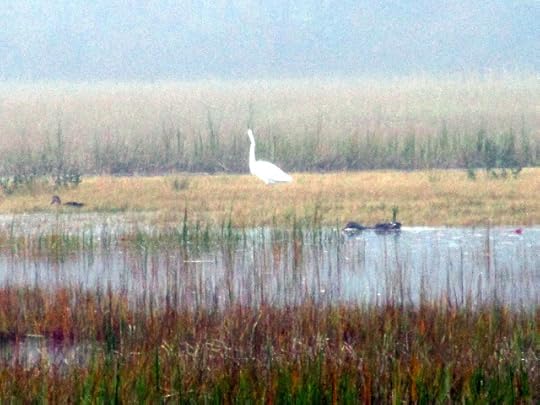Robert Knox's Blog, page 7
December 4, 2020
The Garden of Verse: On the Theme of Gratitude, I'm Grateful for the December 2020 Issue of Verse-Virtual

My thanks to editor Jim Lewis for including three of my poems in the December 2020 issue of Verse-Virtual. The issue includes work by 60 poets, including strong efforts by Jefferson Carter, Steve Klepetar, Betsy Mars, Sarah White, Marilyn Taylor, Carole Stone, Barbara Crooker, Robert Wexelblatt... and so many others.
Of my three poems in this issue, titled The Morning After the Morning After, There Will Be Consequences, and That November Feeling --
all written in the immediate aftermath of the Nov. 3 National Election, the one with the most impact for me is the first. "The Morning After the Morning After" refers to the changes in the outlook for the the final result in the 2 days following Election Day. When I went to bed on Election Day, the hosts on all the networks were speaking in dour tones about the strong Republican turnouts in the traditional "swing states" that would no doubt determine the result of the Presidential election. Texas and Florida, two states in which I'd had (foolish, it appears) hopes for the Democratic candidate were already in the wrong column. Others states, which had handed the Monster a victory in 2016 appeared to be following similar paths this year.... Well, you know all this.
So on the "morning after" Election Day I was not feeling very good. Psychologically hung over. What would i do? Find another country to live in? Express my frustration with my country's affection with a veritable sick and evil nut-job by doing something stupid that I would immediately regret? Break a window somewhere?
Happily, I began to reacquaint my paranoid brain with the pre-election prediction that the still uncounted mail-in votes were likely to run strongly Democratic.
By that second "morning after," that trend was already well in evidence. Hence the emotional recovery in the poem that states in its first line, "I'm stepping from the ledge..." Here's the whole poem:
The Morning After the Morning After
I’m stepping back from the ledge.
The view from there is sickening,
a landscape roamed by entitled monsters
on whom we have pinned badges of honor
for so much crapping on the landscape.
Specimen days in a ravaged land:
sticks with dead flowers, stones with the faces
of people one might have known.
Today, a week from a killing freeze,
the sun shines on the still-breathing leaves
and the compost bin keeps churning.
We walk the edges of a fault line
burned by the frost of a dead man’s embraces,
watching spellbound as the monster bleeds out,
but dare not yet descend
into the pit.
To read the other poems, see Two More Poems To find poems by all 60 contributors to December's issue, see Poems and Articles
December 1, 2020
Calendar Days: Anne and I Begin to Put Together Next Year's Calendar. Here Are Some Pages
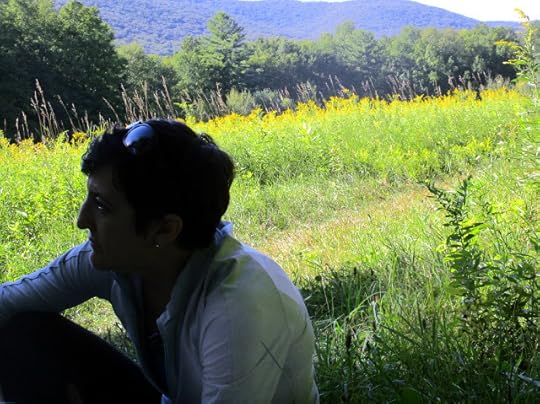
Sonya in the Field: August 2020
We’ve emerged from the hills of Jug End into the paradise of the open fields
Will butterflies appear, ex nihilo, in bursts of Super HD?
Birds sing like articulate brush-strokes from the fertile fingers of animators?
Flags fly in a sky of puffy clouds like the thoughts of heroes, doers, actors on the stage
of events: women
Clouds pass above, like hungry souls praying for the gift of speech
Our daughter, a light into the future,
leads through fields of memories
All the green truth of the living world her truth now
What it means to live this turn of the wheel
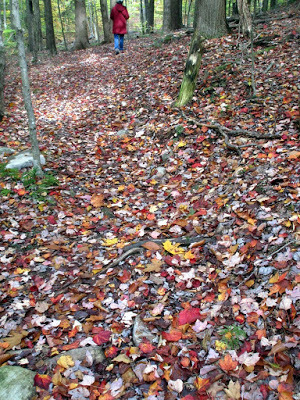 Images of Autumn: October 2020
Images of Autumn: October 2020
Anne walks on a carpet of fallen leaves
in the last days of autumn
From autumn to autumn,
from year to year,
the road leads on.
The leaves emerge in spring,
ripen in May
Hang large and languorous
in summer months.
Then turn the green blanket
of the forest to the farewell costume party of
October
Later, we find them underfoot
No need for the broom
We are walking the trail of the seasons
Each footfall landing on time
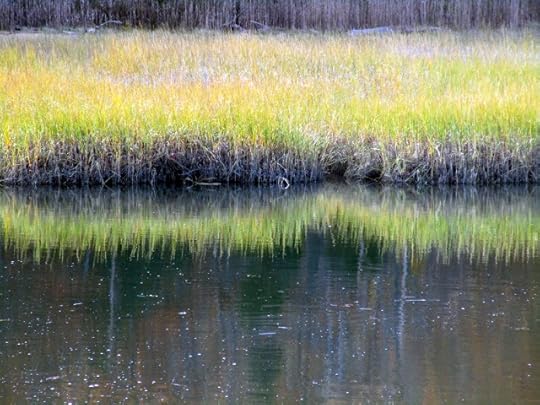
What the Reeds See
The thing in itself. The thing in reflection.
Isn’t this what the painters have so often sought to do? Paint the light. And, as here,
the light on water. The reeds are not painting themselves.
The water is painting them? Or the light.
Who can paint on water? The light. Only the light.
Who sees by light? Us. All of us. This sentient brotherhood. Deer drinking in a stream. Mallards floating by. Fish leaping to visible rumors of winged protein
All of us children Of light
Fog on the Marsh
A salt marsh by the shore. Impressions of a Great Egret and a couple of Mallards on an estuarial stream called Furnace Brook, as fog swirled through an afternoon disguised as some place else.
Who painted the colors? Who wielded the brush?
Concealment blew in the from cold saltwater, an arm of the sea stretching, a few hours lingering here
Inland, a five-minute stroll to the land of Everyday, blind to the occlusions of the shore.
Will that fuzzy white egret ever be the same? Will those mallards be taken back by their friends? Or hooted off
as the by-blows of some illusion?
November 6, 2020
The Garden of Verse: November Poems in a Season of Uncertainty
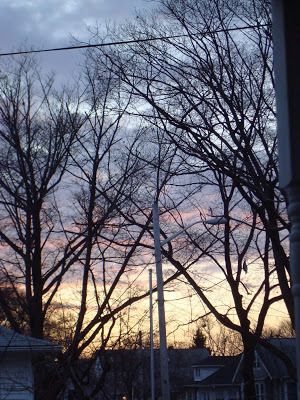
Back before what happened at the beginning of this month -- and which of course is still happening -- the November 2020 issue of Verse-Virtual published three of my poems. My thanks to editor Jim Lewis and the issue’s guest editor Michael Minassian.
But everything feels irrelevant, doesn't it?
In the very last days of October a surprisingly persistent snowstorm dropped five inches of wet snow on the Boston area. Forecasts for snow in October have never meant very much here in the past, so I expected the "slight dusting" we sometimes get. Probably followed by some rain.
Instead we ended up with five inches of very wet snow, that hung on the green leaves and weighed down the heavily freighted branches. Some trees in the neighborhood lost branches.
The temperature wasn't very cold, but it took over a day for the snow to melt, and then the temperatures at night plunged below freezing. Plants died, massacred; turned gray, lost their stuff. I didn't respond fast enough. I had left most of the large houseplants outdoors; they always came indoors in November. It was too cold and snowy and wet for me to deal with them then.
I waited for the snow to melt before trying to bring them indoors. It was too late,
I had failed them. My plants died, including some that I'd watered and cared for over decades. It was a bad sign.
I got another bad sign when my desk computer's hard drive died, after I gave in to some ridiculous anti-virus program and allowed it to shut down the computer. It would not restart. The drive was "degraded." It's been 'repaired,' and is working. But it's not the same. I don't know where things are.
And then it was election day. And four days later we're still counting.
During these troubled days I forgot about my poems, and my poetry community. My 'garden of verse' that blooms anew each month.
But, guess what, it's been there all along. There for me, and for anyone else to walk through, and sample, and smell the roses.
Here's one of my three poems, written during the month of October, which feels like a long time ago. Not about politics, not about my failure to take better care of my garden. But the title is, nevertheless, fitting: "Powerless."
Powerless
I am a refrigerator,
my accumulated coolness weeping away.
I am a kinship group of fully extended oak leaves
swaying and spinning ceaselessly
in the punctuated gusts of the new-season storm
that walks in among us
(like the uninvited guest at the neighborhood mixer
we have not, in fact, ever held)
to turn off the lights and the machines
that keep us all ticking.
I am the sound of the distant tires
huffing off to a place where things can still get done.
I am the silence of things not getting done.
I am the wind deep-breathing after a calculated pause
as if to remind us who is lord of this condition.
I am the emptiness of the silent house,
the shadows in the room's missing corridors,
the powerlessness,
the sound of one pen writing.
To find work by more than 50 poets in the November Verse-Virtual, see November 2020
All the flowering annu
October 21, 2020
The Garden of the Seasons: Big World, Little Me
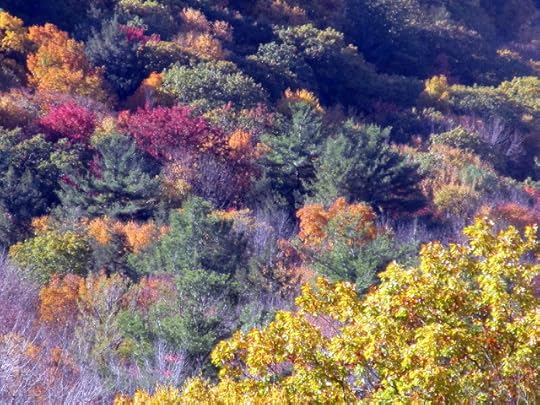
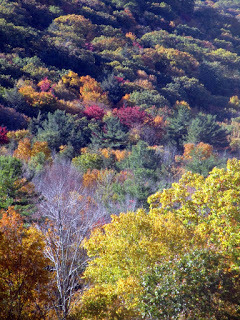 Little, Big
Little, BigToo big for golden dreams, too many golden hills,
stunning views at each new bend of the trail,
a field theory of vantage points
Too many long looks
too far above, beyond me, all so little now
Where are the little words to hold the big moments?
A little life: a forever mountain range sculpted by the glaciers and all those millions of years
in which Earth dreamed itself up,
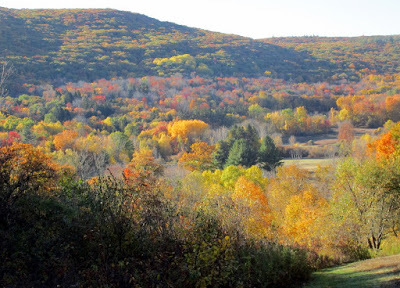 the slow grind of time
the slow grind of time I get as big as I can,
imagine as much, see as far an ocular nerve routed to a brain cell can manage
I can't do it, I can't cut it down to size
It's out there still, larger than life, the place and time I can only be
as anyone can,
and come up short: little me, Big World
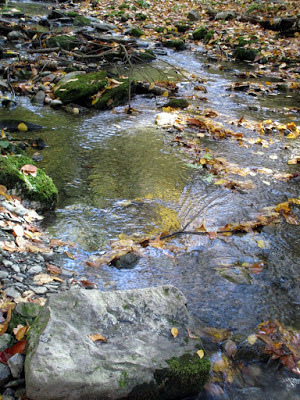
October 20, 2020
The Garden of Verse: "Unmasked Men" and the "Justice Issue" poems
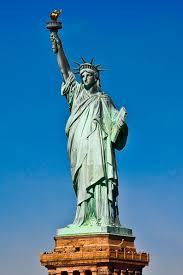
I am grateful to editor Pratibha Kelapure, who states on her 'about' page for the journal, "The Literary Nest," that "Poetry matters," for including my poem "Unmasked Men" in her excellent journal's new issue. I think poetry matters too.
I'm grateful also for the generous comments on this poem I received from a number of readers.
If you haven't read it, here's another chance:
Unmasked Men
Trust only those with masks
the unmasked are stealing your future,
or your children’s or your grandchildren’s futures
Freedom is scarce
They will take yours
and they will not share it,
or give it back
They will consume it alone, down some hole
When you meet them, years later
-- if there is a later, if there are years --
at a highway rest stop
their children will be hungry
their faces lined with fear
The sky will explode with apologies
from the management
All boats will be leaky
Posters will warn of a man in a red hat
The leaders of the coup will be arrested
Trust no one with a camera
Truth rides a bicycle
Zip codes will be randomized in the new
post-P.O.
Bird will fly the wrong way in winter
Ants have colonized your neighbor’s back yard
They are sending scouts, parties of militarized true believers
into yours.
The unmasked ones will tell you all is well
“You can see by our faces that we are honest”
When they approach for an embrace, they have their hands
in your pockets
Their eyes on your daughter
They want to know your boot size
The time to hesitate is through
You can see the future by their smiles
The executioner’s face is not always well hidden
They steal your chickens in broad daylight
They cannot agree on what year it is, or even what day
Their leaders have not approved
the new calendar
Each day is called “now”
by which is meant “never”
Do not trust the ones without masks
Or agree to the toss of a coin
They keep their tails on both sides
They have no masks for the best of reasons:
They have no faces
To see the rest of the issue here's the link The Literary Nest
I am grateful also to Ruben Baca, editor of Necro Magazine, for including four of my poems in the journal’s fall issue devoted to the theme of “Justice.” My poems, and those of the other contributors include lots of contemporary comment here. Unhappily there's lots of ‘injustice’ to go around these days. My poems are “America 2020,” “I Have Lost a Country,” “What Democracy Looks Like,” and “Last Days of the American Empire.” To see my poems and the rest of the magazine, here's the link Justice Issue
The Garden of the Seasons: October Gold on Stockbridge Bowl

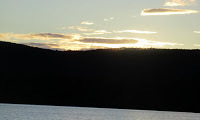
The Golden Bowl
Every autumn we walk down here to the place where can see
that the world glows deeply golden
and the water's blue as blue can be.
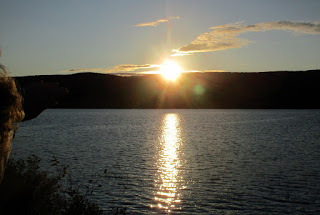 When the sky is open wholly
When the sky is open whollyand the sun sits on the hillside, glow on glow,
everything is in its place, and the place is one we know.
Every evening come the shadows, and the glow begins to fade,
still we come again the next day
to see what autumn gold has made.
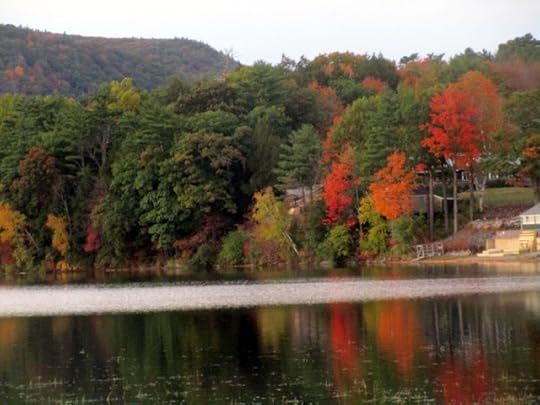
October 3, 2020
October Poems: Verse-Virtual keeps turning a new page and revealing beautiful moments, like the colors of the autumn hills
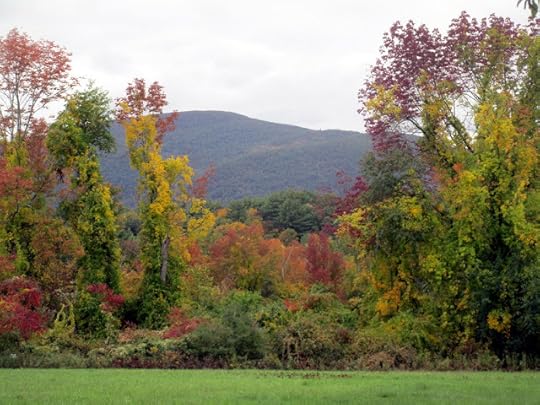
My thanks to editor Jim Lewis for producing another excellent issue of Verse-Virtual, the online poetry community and monthly publication, that this month offers work by 46 poets.
Here's what Jim has to say on how poets respond to the difficulties of a full-blown pandemic and the political chaos of our day, even as October, arguably the most inspiring of months, has begun to turn its autumn lights on us:
"Poets have always been active participants in the struggle to survive difficult times. We write to persuade. We write to denounce. We write to document. We write to challenge the wrongs that we see. What we do NOT do is throw up our hands and surrender to despair. "this is not the time to howl" is my personal poem of defiance. If yours has not been written yet, write it. Share it. Use the gift of your words to encourage everyone you can reach to stand up and be counted in this conflict."
As a contributing editor for Verse-Virtual, going on five years now, I have the fortunate opportunity to publish new work each month in the online journal.
I have three poems, my standard quota, in the October issue. The first is my comic take (as I hope should be clear) on a trailside warning posted at Notch View, a beautiful nature preserve and one of my favorite woods-walking sites in Berkshire County, Massachusetts.The poem plays on a misunderstanding of the sign's use of the phrase "classic style." The site managers are, of course, speaking of the trail's use by cross-country skiers.
The poem's speaker (that's me), as the poem indicates, is thinking about everything else to which the term 'classic style' might apply. The poem begins this way:
Classical Style Only
My daughter slide-steps sideways
down the path at Notchview Reservation,
arms akimbo, see-sawing in stately fashion
She’s ‘walking like an Egyptian,’
so the cant phrase goes,
because of course the trail sign clearly states:
“Classical Style Only”
I am trying to imagine a fashionable Athenian
or Augustan way of proceeding
while lacking a toga, or a tunic,
or whatever cloaked sublimely homely Socrates
when he paced up and down the Agora
directing flights of reasoned disputation
to mind-unfogging peepholes into the ‘World of Forms,’... The second poem "October Rain" attempts to describe someof the characteristics of its subject, and, I hope, needs no further explanation. The final poem is an attempt to put into words the feelingsproduced by an instrumental song entitled "As Times Change" by Kathryn Toyama that I find almost (but not quite) inexpressibly moving. It's at least my third try at offering awritten response to this piece of music, which (of course) does not require one. Please take a look. The poems can be found at Verse-Virtual Oct. 2020
September Poems: Reasons why if you can't love the season you're in, love the one to come
So many wonderful poems in September's Verse-Virtual. Here are a few I keep going back to.
I was drawn into Sean Kelbley's poem "Explanation" right from the beginning when the speaker's "Oma" explains where her home was.
"Batschka, Oma said, and ran her palms across her face as if to smooth a map. At the center of the map, her eyes burned like specific villages." Those two similes, one for the old woman's gesture --"as if to smooth a map" -- and the second, for her eyes -- "burned like specific villages" -- tell us that the road to an 'explanation' is not going to be all sweetness and light.
Betsy Mars's beautifully phrased praise-poem to canine virtues, "What Is Essential," kept me re-reading to appreciate fully these essentials:
"you know
language is the source of misunderstandings",
Instead, as the poem details the essentials of the dog's understanding:
"You understand the necessity
of keeping the baobabs at bay
and raking out the volcanos –
even the ones that might be extinct.
You dig out roots in the yard
and rake the carpet into submission."
The poem goes on from here to detail the sublimely wordless understanding between person and dog. How can we fail to appreciate a pet that holds trees at bay and keeps carpets from pulling a fast one?
September includes two beautifully haunting poems by Jeff Burt. "Snowflakes" finds reasons for 'angels' everywhere.
His poem titled "Flash" intrigues and moves us with explanations for a mysterious light phenomenon:
"Once I thought it was the acrylic panel on my luggage
reflecting the nose light of an airliner about to crash.
Once I thought it was a beacon calling me
to read Hafiz on indulging joy
when knowing God surprises us
by awkward revelations when we least expect them."
The poem convinces me that 'revelations' are likely to awkward. I'll stop complaining about the noise in the street now. Maybe it's trying to tell me something.
So many of the wonder creatures in September's poems are dogs; a few are angels. The subjects of Irving Feldman's poem “Of, course we would wish“ are compared to angels at one point, but they're really not. They are, as the poet's note tells us," artist George Segal’s plaster casts" viewed at an exhibition. We'd like these plaster casts to appear e 'angelic,' the poem knowingly explains, tells us, but in fact "it's the dead themselves they resemble,..."
This terrible resemblance is so beautifully expressed that we can't pull ourselves away:
"It hurts to see them so decent and poor.
And it does no good to scold them for it,
to shout at these newly impoverished relations
crowding timidly in the narrow hallway,
or recall to them the old extravagance,
or tempt them back with favorite morsels
and the glowing tales that made the hearth warmer.
This poem doesn't simply describe a work of art. It gets inside it (and us too.).
Marjorie Moorhead "Catching My Eye" begins with these carefully laid out lines, like clues to a mystery:
"Imagine a church pew lady’s glove.
White lacy upturned palm,
cupping bees and butterflies,
swaying gently on long stem,
leaves like feathers of a green bird.
Many tiny blossoms together
in a circle-burst of celebration
decorating hot July fields,..."
At this point I'm betting "Queen Anne's Lace." That turns out to be just one of the contenders in this name game. But all the names, and the all imagery, the poem offers to make the inward eyes envision this summer marvel are equally winners:
Call it summer time, the poem tells us:
"Heat waving
off pavement. Fields buzzing alive."
I do call it summer time. And this poem nails it.
William Greenway's two intensely realized personal history poems got inside me as well. "Last Rites: Shark Week" alludes with a dark irony to an invitation to the rite of Communion. Of course the poem's darkly ironic invitation , as revealed in the poem's richly language, is offered by a shark:
"[I] never dreamed
back then how quickly things unseen
could rise from down below,
and how you could hear
not get out, now, but
Happy are those who are called
to his supper."
It's a poem well worth rereading in its entirety. Something of the same tone is captured by a second poem, "Spooky Nook Road," that looks forward to the "scabrous scarecrows" and "headless horsemen" of that autumn holiday.
I don't celebrate the end of summer. I miss it. But September 2020 shows us how much we have to look forward to.
September 22, 2020
The Garden of Verse: The Gifts of September
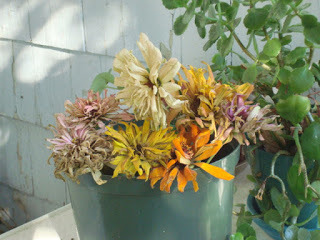
The gifts of September's Verse-Virtual, the online journal that publishes scores of new poems every month, keep calling, showing me new wonders each time I unwrap them. Here are a few of the poems I keep going back to.
Betsy Mars's beautifully phrased praise-poem to canine virtues, "What Is Essential," kept me re-reading to appreciate fully these essentials:
"you know
language is the source of misunderstandings",
Instead, as the poem details the essentials of the dog's understanding:
"You understand the necessity
of keeping the baobabs at bay
and raking out the volcanos –
even the ones that might be extinct.
You dig out roots in the yard
and rake the carpet into submission."
The poem goes on from here to detail the sublimely wordless understanding between person and dog. How can we fail to appreciate a pet that holds trees at bay and keeps carpets from pulling a fast one?
I was drawn into Sean Kelbley's poem "Explanation" right from the beginning when the speaker's "Oma" explains where her home was.
"Batschka,
Oma said, and ran her palms across her face
as if to smooth a map. At the center of the map,
her eyes burned like specific villages."
Those two similes, one for the old woman's gesture --"as if to smooth a map" -- and the second, for her eyes -- "burned like specific villages" -- tell us that the road to an 'explanation' is not going to be all sweetness and light.
September includes two beautifully haunting poems by Jeff Burt. While "Snowflakes" finds reasons for 'angels' everywhere, the poem titled "Flash" intrigues and moves us with explanations for a mysterious light phenomenon:
"Once I thought it was the acrylic panel on my luggage
reflecting the nose light of an airliner about to crash.
Once I thought it was a beacon calling me
to read Hafiz on indulging joy
when knowing God surprises us
by awkward revelations when we least expect them."
The poem convinces me that 'revelations' are likely to be awkward. I'll stop complaining about the noise in the street now. Maybe it's trying to tell me something.
So many of the wonder creatures in September's poems are dogs; a few are angels. The subjects of Irving Feldman's poem “Of, course we would wish“ are compared to angels at one point, but they're really not. They are, as the poet's note tells us," artist George Segal’s plaster casts" viewed at an exhibition. We'd like these plaster casts to appear e 'angelic,' the poem knowingly explains, tells us, but in fact "it's the dead themselves they resemble,..."
This terrible resemblance is so beautifully expressed that we can't pull ourselves away:
"It hurts to see them so decent and poor.
And it does no good to scold them for it,
to shout at these newly impoverished relations
crowding timidly in the narrow hallway,
or recall to them the old extravagance,
or tempt them back with favorite morsels
and the glowing tales that made the hearth warmer."
This poem doesn't simply describe a work of art. It gets inside it (and us too.).
Marjorie Moorhead's "Catching My Eye" begins with these carefully laid out lines, like clues to a mystery:
"Imagine a church pew lady’s glove.
White lacy upturned palm,
cupping bees and butterflies,
swaying gently on long stem,
leaves like feathers of a green bird.
Many tiny blossoms together
in a circle-burst of celebration
decorating hot July fields,..."
At this point I'm betting "Queen Anne's Lace." That turns out to be just one of the contenders in this poem's name game. But all the names and the all imagery the poem offers to make the inward eyes envision this summer marvel are equally winners:
Call it summer time, the poem tells us:
"Heat waving
off pavement. Fields buzzing alive."
I do call it summer time. And this poem nails it.
William Greenway's two intensely realized personal history poems got inside me as well. "Last Rites: Shark Week" alludes with a dark irony to an invitation to the rite of Communion. Of course the poem's darkly ironic invitation , as revealed in the poem's richly language, is offered by a shark:
"[I] never dreamed
back then how quickly things unseen
could rise from down below,
and how you could hear
not get out, now, but
Happy are those who are called
to his supper."
It's a poem well worth rereading in its entirety. Something of the same tone is captured by a second poem, "Spooky Nook Road," that looks forward to the "scabrous scarecrows" and "headless horsemen" of that celebrated autumn holiday.
I don't celebrate the end of summer. I miss it. But September 2020 shows us how much we have to look forward to.
You can find all these poems here:
September 4, 2020
Poems of Love, Sorrow, Remembrance and Earth's Enduring Beauty in September's Verse-Virtual
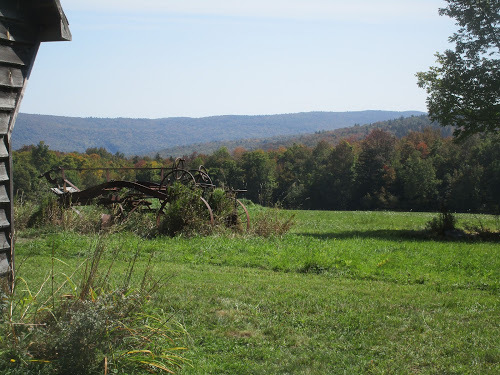
The September 2020 issue of Verse-Virtual, the online journal with a full bloom of new poems every month, takes us many places.
Alan Walowitz, the issue's guest editor, recalls being “short-armed" by the local cop known as “Old Trench Coat” and ethnically profiled into a police line-up. The blues were looking for a guy who was "out jacking radios on Jewel" and who, we learn, looks Jewish. It's fall, the poem tells us, and
the way it does
this time of year in Queens
As it does throughout the Northeast, even in New England's Berkshire hills, where I'm writing this. But the light -- strong, indifferent, ascending, declining -- is always part of the picture, and I'm happy the poem, "Hardboiled," shows it to us here
Verse-Virtual editor Jim Lewis recommends Steve Klepetar’s poem “Forgiving Hands,” a dreamy folk tale or parable, with a hint of magic realism. After drinking too much wine to take an older person to the hospital, the poem's "we" awake guiltily and discover that the older person up and cooking pasta. "every one of us was still alive," the poem tells us, then adds, perhaps chillingly, "or so we thought..." Read the rest in September 2020.
Jim Lewis also recommends Tamara Madison’s "The Nicest Man," a poem about a father’s surprising late-in-life discovery of a PBS role model.
You can also find Lewis's own parable of our own pandemic times, "tell me why, tell me where," a tightly told tale of mask-wearing in a correctional setting.
And three poems about an initial visit to Israel by Donna Hilbert, who says, “I miss the adventure of being in a country for the first time.” Altogether, the September issue features original work by 57 poets, a whale of a poetic haul.
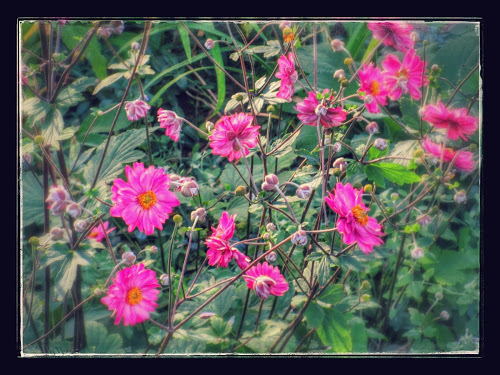
Finally, as you will not be surprised to learn, the issue includes three of my poems.
I'll post below my own nostalgic ode to the swiftly passing season, "The Truth About 'Summer,'" a time of year I love and hope will linger in its best mellow, late-season fashion. I wrote this poem while listening to the instrumental song titled "Summer," written by Peter Kater.
The Truth About 'Summer'*
oh, too gentle for what we know of you
here on earth beneath your scorching eye
How the wind blows! the rain lashes!
We beg for your peace, implore the god of Weather,
that unending scroll of profane Revelations,
for the mercy of your milder face
not only for mariners naked in the vulnerability
of all who cannot walk on water,
but those who live by sewing life
into the earth, and pray for rain,
but not too much,
who feed grass to beasts, dread bugs, pick infested leaves
off tomato plants,
Sing "Glory in the Morning" to Morning Glories
Escape the heat in river sloughs,
Hunger for shorelines,
for shallows lacking all creatures
that sting or bite,
Secure their harvests, their orchards, their vines,
their trees with paper spells
purchased from witch doctors
Inspect their animals for signs of plague
Protect their children from signs of plague
Lift their prayers to the skies,
stuff raspberries into the freezer
when the growing is good
and fill all the world's vases, old wine bottles, occasional canteens,
and other vessels
with the severed stems of beautiful things
that cannot in the nature of things —
in the Nature of anything —
endure
But listen! Listen to this fluted voice
of the praise singer,
Think of red fruit, and the dried and frozen sustenance of
winters, all those other days,
those other seasons,
when the sweetest song — song of fluted praise...
floats immaculately away
*After Peter Kater's "Summer," in a version heard on Spotify
08.05.20

